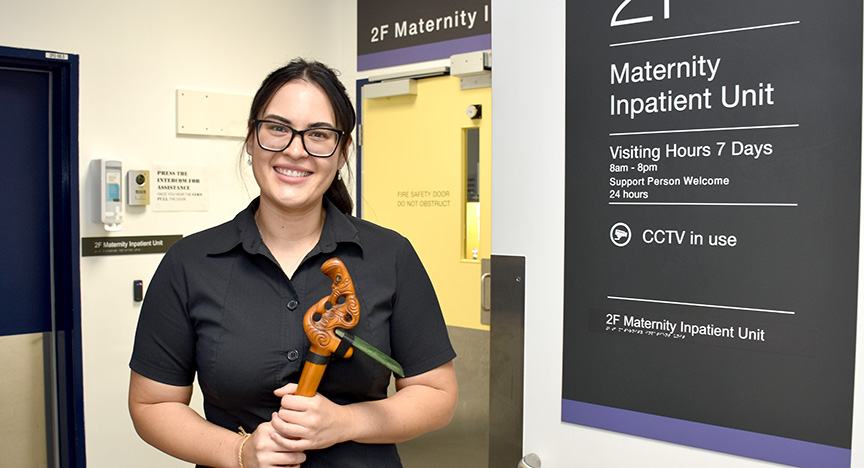
Pasifika Midwifery Group Practice (MGP) has welcomed their first Mãori Identified graduate midwife in an exciting step forward for culturally sensitive maternity care.
Tanae Hill said she had a calling to be a midwife from a young age and was dedicated to improving maternal outcomes for Māori and Pacific Islander women.
As a student, Tanae said her journey led her to the Pasifika MGP Hub where she had the opportunity to develop her skills and connect with women who she culturally identified with.
“Through this, I was able to build amazing relationships that have led me to being not only a Graduate Midwife but a very proud Māori Midwife who gets to work in the Pasifika Hub,” she said.
When asked how her cultural background influenced her approach to midwifery, Tanae highlighted that it had enhanced her capacity to establish connections with women.
“I feel my cultural proficiency and humility empowers me to recognise the importance of Māori and Pacific Islander women’s voices during pregnancy and birth,” she said.
As the first Māori identified midwife in her position, Tanae said she was committed to including Māori cultural practices into her care, including the incorporation of generational knowledge, recognition of the importance of Whanau (family) in a woman's journey into motherhood and the correct pronunciation of names.
“I aspire to inspire diversity within the midwifery profession and although my journey is still new, I hope to encourage other midwives and students to embrace opportunities that promote culturally capable care,” she said.
Tanae said she wanted to create a legacy where Māori and Pacific Islander women were comfortable being key decision makers and were at ease making autonomous decisions for themselves and their families.
“Research also suggests that employing maternity staff from Māori and Pacific Islander backgrounds can increase uptake of services, especially in culturally tailored environments.”
Addressing potential cultural differences, Tanae emphasised self-awareness to navigate biases and keeping an open mind to ensure women remained at the centre of care planning.
To aspiring midwives, particularly from less represented backgrounds, Tanae’s advice was to pursue their passion and to use their voice to advocate for those they cared for. She also stressed the importance of staying informed with evidence and research.
Tanae said continued collaboration was key to ensuring a holistic and culturally sensitive approach to maternity care within the Pasifika MGP group.
“Collaboration is so important and essential in ensuring the individual needs of a Māori and Pacific Islander woman are met,” she said.
“This is something that as student I was able to dive into and as a Graduate Midwife will continue to develop, especially in weekly hub meetings where collaboration is fostered between the midwives, the obstetric team, allied health and social services.”
Looking ahead, Tanae said she envisioned a future where continuity of midwifery care was widely available, catering to the diverse needs of women in Logan.
“I hope to see further expansion of existing Logan Midwifery Hubs to ensure our communities have access to this model of maternity care and to enable midwives to work with women they culturally identify with,” she said.